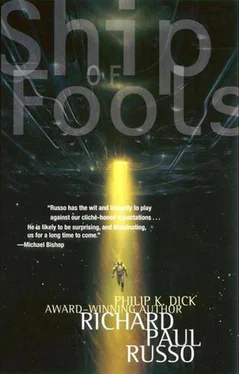“No,” I said, “it won’t be easy. But there must be a way. There must be records somewhere in this ship. The Argonos must have visited worlds or systems like that in the past. If nothing else, it had to have been built in orbit around one those worlds, if not Earth itself.”
Before the bishop could interrupt, I turned to him and held up a hand. “I know what Bishop Soldano claims—that the Argonos has always existed. Presumably created outside of time in some way and disconnected from Earth.” I shook my head. “But none of us really believes that. I’m fairly certain the bishop himself doesn’t believe it.”
The bishop surged up from his chair. “You!” he roared. “I have had enough from you! Now you presume to tell me, tell all of us, what I believe. I will not have it!”
I’d gone too far. His arms trembled, his hands gripped the edge of the table; his skin was flushed and sweating. I had to do something.
I bowed my head once, then said, “I apologize, Bishop. I was out of line—” I hesitated, not sure what else to say. Saying too much could be just as bad as saying too little. “I apologize.” I left it at that.
He remained standing a long time, glaring at me. Neither of us had good options. He could walk out of the meeting, but that would be dangerous for him; he needed to know what occurred, he needed to see and hear it; he needed to be there to try to influence the outcome. As for me, I could do no more than I had. And I still had to complete my presentation. I wasn’t backing down now, and I couldn’t afford to appear as if I had any hesitations. The bishop would leap on any sign of weakness.
The silence and the tension stretched out until at last the bishop breathed deeply once and nodded. “All right, Bartolomeo.” He slowly lowered himself back into his chair. “I will accept your apology. But that doesn’t mean I accept your absurd notions, your ridiculous proposal.”
Okay, I thought. Standoff. I turned to Toller. “August. You’re the ship historian. You know our records. What do they tell us about what I’m looking for?”
The old man slowly shook his head. “They are incomplete. Or rather, they are complete only for the last two hundred seventy-three years. That is when they began. We have nothing before that.”
“Two hundred seventy-three years?” I repeated. “That’s all?”
Toller nodded.
“Why? The Argonos has been around much longer than that. It’s understood. According to the bishop, it’s been around forever.”
“Something happened,” Toller said.
“What?”
Toller shrugged. “A plague that went through the Argonos . Most of you have heard about it. In itself it should not have caused such… devastation. But people got scared, and many went mad. That time came be to be called the Repudiation.”
I’d heard the name, a few stories, but I’d never been sure it was more than a myth. No one seemed to care much about it; it had occurred so long ago. I’d imagined mobs of diseased people tearing through the corridors of the Argonos , burning everything they could find, destroying machinery, defacing walls, screaming at everyone they saw.
“Before it had run its course, the plague killed almost a third of the population of the Argonos . The Church was blamed by some. God by others. The ship, captain, and crew by still others. The Church managed to protect itself, but several factions of scared and maddened people took over the Argonos for a short time. Only a few weeks, but long enough to disable much of the ship’s infrastructure, and purge the ship’s logs and navigational records. When the crew regained control of the Argonos , most functions were restored, but the logs and other records were never recovered.”
He leaned on his cane and adjusted his position. “Before that, there was no official ship History. The only official records were the ship’s logs.” He sighed heavily, shaking his head. “But they were all destroyed. Which is why the History was begun, to provide an alternate record should anything like that occur again.”
Someone spoke up, asking the question I was about to ask myself. “Couldn’t the ship History be destroyed as easily as the ship’s logs?”
Toller smiled. “There are too many copies made, distributed and hidden throughout the ship, in various formats. Even I don’t know how many, or who has them. Some would always survive.”
“But there is nothing in these that can help us,” I said.
Toller shook his head. “That’s not quite true. There is an Appendix to the History, recorded summaries of what the early historians remembered or had been told about the decades and centuries that preceded the beginning of the official History. It makes for fascinating reading, particularly the discussions of the Repudiation and the years leading up to it, but by its nature the Appendix is fragmentary, anecdotal, sketchy in parts. There are, however, several references to just what you want, Bartolomeo. Star systems with populated worlds, interplanetary transportation, political and social networks. But when we encountered those systems, those worlds, we never stayed long. We were looking for isolated outposts, colonial settlements, lost missions. More importantly, there is no navigational data in the Appendix. There are planetary and system names, but no locational coordinates. The historians are not navigators. Only the ship’s logs would have the information needed to locate any of those worlds.”
I closed my eyes, thinking. “And the ship’s logs were all destroyed?” I asked. I opened my eyes and turned to Cardenas for confirmation. She nodded.
“Toller is correct. They were all destroyed.”
“But we still have the star charts, right?” I wasn’t giving up. “We don’t navigate blindly, the charts still exist with all the coordinates.”
“But no names,” Cardenas said. “All named references were deleted except Earth’s. We’ve gone back to Earth, many years ago, and there was nothing there. We have names without coordinates, and coordinates without names.” She paused and sighed. “The Repudiators did a very thorough job. Navigators have worked with Toller and previous historians, trying to match the names and references in the History to what we have in charts…” She shook her head. “We’ve never been able to do it.”
I looked around the room. The bishop had a content, almost smug look on his face. “There must be records somewhere on this ship that weren’t destroyed,” I said. “No one can be that thorough. There are always dissidents who will hide copies, who will smuggle information away. They must be out there somewhere.”
“Probably,” Nikos replied. “But also probably lost, forgotten, damaged, accidentally destroyed.”
I surveyed the room again. “Give us time to find them,” I said. “We’ll send a plea throughout the ship, to the downsiders as well as the upper levels. Just give us time.”
“Why?” Bishop Soldano rose slowly to his feet. “So more people can die? Even if we could find complete records somewhere, that doesn’t make your proposal any less absurd. I said it earlier—that starship is evil. Even if we could take it with us, which I very much doubt is even possible, and even if we could find a world filled with a billion people and all their wonderful tools and resources, taking that ship to them would only increase the harm it can cause, would only spread its evil. Would only magnify the death and destruction.” He paused for effect. “We cannot do it. We must not.”
I turned to Cardenas. “Can we do it?”
She nodded. “I think so. Your idea of tethering it to us with cables is probably not too practical. Acceleration is one thing, but trying to stop without its ramming us from behind would be more difficult. But I think we could manufacture a docking mechanism that would be workable.” She shrugged. “If the Planning Committee wants me to, I can talk to the engineers and work out the feasibility.”
Читать дальше












